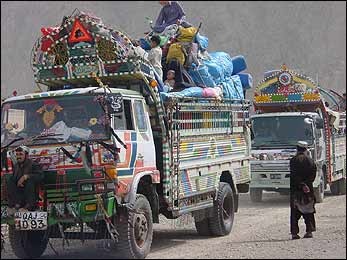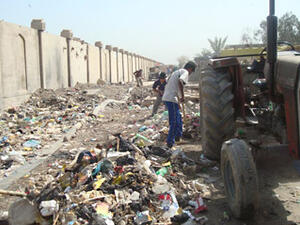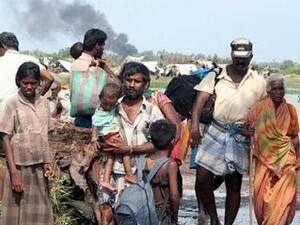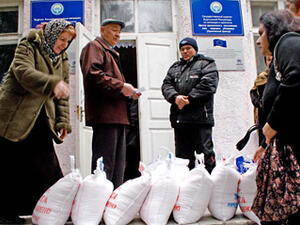Afghans continue streaming home after first wave
Afghans continue streaming home after first wave

Afghan refugees returning from Quetta, Pakistan in April 2003.
TEHRAN, Iran, April 24 (UNHCR) - The end of winter has meant that Afghan refugees are again heading back to their homeland from neighbouring Iran and Pakistan, with the numbers increasing steadily as the temperature rises.
But there has been a sharp fall since last year in the total number, especially from Pakistan where a state of near euphoria among refugees after the fall of the Taliban sent Afghans flooding back in 2002.
In March of 2002 alone, the UN High Commissioner for Refugees assisted 128,305 Afghans to return from Pakistan, followed by a further 272,691 in April. This year, more than 19,000 Afghans had been processed under UNHCR's voluntary repatriation programme as of April 22.
In contrast, the decline in Iran from last year's levels has been much less drastic. In the period April 9-21, 2002, when the voluntary return initiative first started in Iran, 16,348 Afghans returned from there - 11,419 with the assistance of UNHCR and 4,929 "spontaneously" without the agency's help. In the same period this year, 9,859 Afghans returned from Iran - 5,966 under the UNHCR programme and 3,893 spontaneously.
The causes of the decline are varied.
The enthusiasm of last year - especially visible in Pakistan - has been replaced by a more sceptical view of the conditions awaiting returnees in Afghanistan, where the rebuilding of their battered country is progressing slowly. UNHCR surveys show that many refugees fear they will not find housing or jobs, making them reluctant to abandon even the menial work and difficult lives they usually face outside Afghanistan.
Those who went home in the first wave included many people with the least attachment to their countries of refuge. Those who remain, about 4 million Afghans, have deeper roots to pull up. Large numbers of Afghans know no other home than Iran or Pakistan, where the first refugees arrived nearly a quarter century ago.
Perhaps most troubling has been the continuing unrest in Afghanistan, nearly a year and a half after the Taliban regime was driven from power and a new regime installed in Kabul.
"UNHCR and its partners have worked hard to help more than 2 million people return home over the past year, but the sustainability of those and future returns is now being jeopardised by insecurity in parts of Afghanistan," Ruud Lubbers, the High Commissioner for Refugees, said recently.
Since the murder of a staff member of the International Committee of the Red Cross in southern Afghanistan in March, more than 10 international non-governmental organisations have pulled staff out of Kandahar. Several other areas of Afghanistan are also closed to international aid workers because of insecurity.
UNHCR's office in Spin Boldak, Afghanistan, on the border where returning refugees arrive from Baluchistan and Karachi in Pakistan, has been closed since the start of the war in Iraq because of security concerns.
An office in Khost, eastern Afghanistan, where iris-recognition equipment was supposed to be installed to ensure refugees do not make repeated assistance claims has never been able to open. Instead, all refugees returning from Pakistan are processed before crossing the border.
The planning totals for this year are high - a precaution as the number of Afghans who returned from Pakistan last year hit nearly four times the 400,000 predicted. This year, UNHCR has made provisions to assist 600,000 Afghan refugees back from Pakistan and 500,000 from Iran.

The pace of returns has slowed compared to 2002, but a steady stream of Afghan refugees are still going home from Pakistan.
Despite the relatively low numbers going back so far this year, the total number of Afghans requesting help to return since the start of the voluntary repatriation programme in March 2002 remains impressive.
UNHCR has helped about 1.6 million refugees to return from Pakistan. A small number have also gone home on their own. From Iran, a further 419,879 Afghans have returned - 277,749 assisted by UNHCR and the rest going spontaneously.
And one of the main obstacles to returning a year ago may be easing. After years of drought, Afghanistan - even the parched south - received good rains over the winter.
April's downpours caused the sudden swelling of the Helmand river, which forms the border between Zaranj in Afghanistan and Zabul in Iran, and forced the local UNHCR staff to improvise. They found a barge that had not been used for years - the river is usually a dry channel - and turned it into a ferry for returning refugees.
The number of Afghans heading home this year may be more modest than in 2002, but having tested the water, UNHCR is standing ready to help anyone who wishes to go back to Afghanistan.









